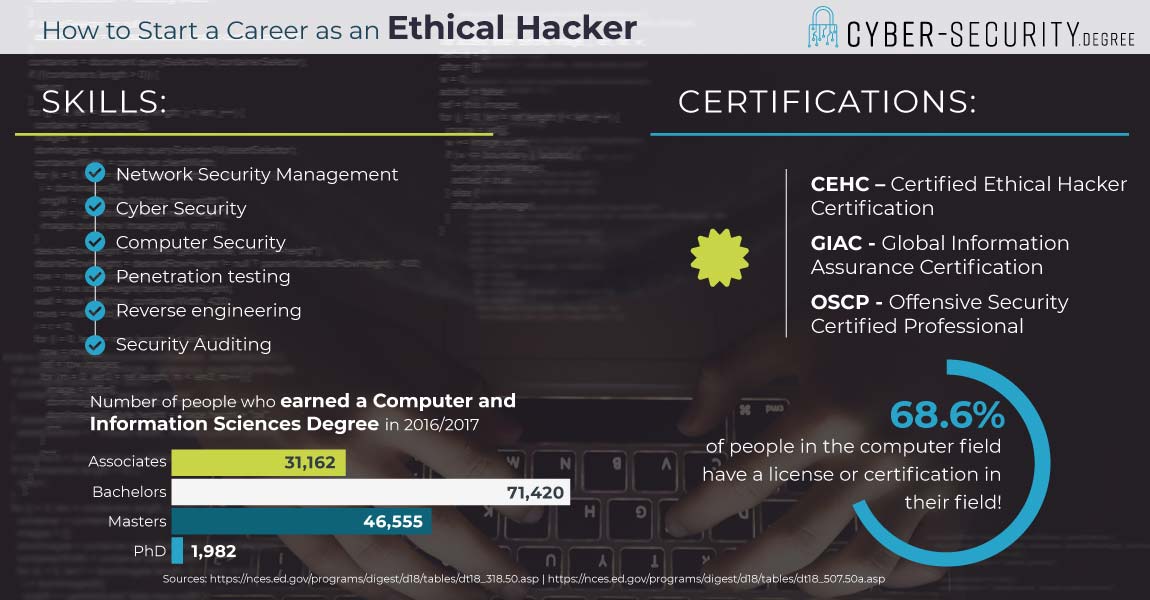White Hat Hacker
A White Hat Hacker plays a key role in cyber security. As ethical hackers they thwart attacks in real time. Certified Ethical Hackers work in health care, finance, government, energy and much more. So, if you want to put programming skills to use, this may be a perfect career path.
What is a White Hat Hacker?
A White Hat Hacker is an ethical hacker. These pros are not malicious like black hat hackers and use their skills to protect systems. One of the things white hat hackers do is to proactively find weak areas in security networks. They do this in order to fix them before they can be exploited by attacks.
A ‘black hat hacker’ works on the other side of the fence. They try to take down networks, steal data, or compromise systems. As a result, a white hat hacker works to fend off black hat hackers who are unethical. To protect networks and systems against attack, white hat hackers do a few things. For one, they work behind the scenes.
As ethical hackers, they perform penetration tests to probe systems for holes in security. They also upgrade systems and assess vulnerable areas to reduce risks.
What’s the Difference Between White Hat Hacker and Penetration Tester
Both white hat hackers and penetration testers work in info sec. But there are differences between them to know about.
Pen testing is one process that identifies where security is vulnerable. And if the system has any flaws, risks, and unreliable issues. The goal of a pen test is thus to probe a system without causing any damage. As such, it mimics what cyber criminals would try. In so doing, it also predicts how a hacker could compromise the system.
Ethical hacking is an umbrella term for all hacking methods. White hat hackers use pen testing as well as other methods related to cyber attack defense. There are two key goals of ethical hacking. One is to use pen testing. Another is to fix the results of a pen test before a malicious attack can exploit it.
Why Pursue A Career in Ethical Hacking?
Ethical hacking skills may be the gateway to a wide range of lucrative and in demand jobs. The Bureau of Labor Statistics (BLS) predicts 32% more jobs for info sec analysts to 2028. And a potential annual salary of $98,350.
One reason for this uptick in jobs is the shortage of skilled workers. It is also because cyber attacks happen more often and are getting more complex. As one report says, hackers are the immune system of the internet. And the internet gets safer every time white hat hackers uncover bugs, find and fix vulnerable areas.
What Skills do you need to be an ethical hacker?
Per Payscale, ethical hackers need a few years of experience in a security related field. They may also need a degree in computer science.
Some white hat hackers obtain a CEH credential too. CEH stands for Certified Ethical Hacker. And is a way to show employers you mastered skills. The CEH comes from the EC Council. They claim it to be the world’s most advanced certified ethical hacking course.
Their exam is for early career stage Ethical Hackers. It has 125 questions and takes 4 hours to complete. To prep for the CEH many take the CEH training program. The cost of the course is $850 and covers 340 attack methods used by today’s hackers. Like malware threats, hacking web servers, and cryptography.
If you do not wish to take the course, the exam will cost $100. And will entail 2 years of work experience in Info Sec. There are another two certs to consider. The GPEN and the OSCP.
The GPEN is available through two places. The GIAC (Global Information Assurance Certification) and the SANS Institute. Certification objectives include penetration testing methods and the legal issues surrounding it. It will also test your ability to conduct a pen test.
Recertification happens every 4 years and will cost $429. You also need to submit 36 CPE credits and take the current exam at time of renewal. The Offensive Security Certified Professional (OSCP) certification is another pen test cert. It assesses your practical and deep grasp of the pen testing process.
To become certified, you must complete Offensive Security’s Penetration Testing with Kali Linux (PwK) course. You also have to pass the 24-hour hands-on exam. This will cost $800. Unlike other certs, you do not need to renew it.
Purdue University Global
- Experience world-class education online: Purdue Global offers 180 programs at associate’s, bachelor’s, master’s and doctoral levels
- Courses taught by highly respected faculty members who are experts in their fields
- Competency-based ExcelTrack™ Programs may allow you to earn your degree faster and for less money
Popular Programs
Human Services, Business Administration & Management, Medical Assisting, Early Childhood Education…
Southern New Hampshire University
- Take advantage of some of the nation’s most affordable tuition rates, while earning a degree from a private, nonprofit, NEASC accredited university
- Qualified students with 2.5 GPA and up may receive up to $20K in grants & scholarships
- Multiple term start dates throughout the year. 24/7 online classroom access.
- Offering over 200 online degree
Popular Programs
Business Administration, Psychology, Information Technology, Human Services…
Ethical Hacking Degrees
Most entry level info sec jobs call for a bachelor’s degree. Some people earn their degree in computer science. Degrees in info sec / assurance, programming and IT are also common. When choosing your cyber security degree, you can look for ethical hacking courses. These may include ways to reverse engineer and use pen tests.

How Much Money Do Ethical Hackers Make?
PayScale reports that the median salary for an Ethical Hacker is $84,000. The lowest 10% earn an average annual salary of about $37K. And the top 10% make an average of $154K per year.
| Experience Level | # of Years Experience | Median |
| Entry Level | > 1 year | $54K |
| Early Career | 1-4 years | $90K |
| Mid-career | 1-4 years | $100K |
| Experienced | 1-4 years | $120K |
Ethical Hacker Job Titles to Look For
The field of ethical hacking is evolving. And with it, new job titles are emerging too. As a result, you may not see jobs posted for ‘white hat hackers’. HackerOne calls them “bug hunters” but in industry, they may use one of these:
- Cyber Defense Analyst
- Senior Ethical Hacker
- Vulnerability Assessment Engineer
Professional Resources Organizations
There are a few professional resources for white hat hackers.
Cybrary. It serves more than 2.3 million IT and cyber pros. The site offers video and virtual lab training. They also offer access to an online community plus courses to prep you for certs.
GIAC (Global Information Assurance Certification). They offer various certifications. Like ones related to hacking and penetration testing.
EC-Council. EC Council operates in over 145 countries. Apart from access to a robust online network, they offer credentials. They also have a bug bounty program and many articles to keep you in the know.
Continuing Education
Now that you have a certification, you may need to keep it current. One way is to earn continuing education credits (CECs). You may earn CECs by pursuing a college degree. Or, your credential provider may set other terms and rules.
Here are a few ideas that may help you keep up to date.
- Attend seminars or conferences about IT Security
- Read (E.g.InfoSecurity-Magazine)
- Prepare an info sec related presentation
- Take part in a Bug Bounty Program
- Be an active member of an IT Association
- Take a college course or pursue a higher level cyber security degree
Most organizations that you are able to earn a certification program from will also offer continuing education. For example, the EC Councils program is called CodeRed. They offer small training options via a subscription model.
Another option is Offensive Security. They offer courses of all kind and several certifications. Best of all, their training programs include new techniques. These can help workers on the job currently. Examples are Penetration Testing, Attack Simulations, and Virtual Labs.
Lastly, explore large online course providers such as Coursera. Coursera partners with different universities to offer courses such as ‘Cybersecurity and the Internet of Things’, ‘International Cyber Conflicts’ and ‘Real-Time Cyber Threat Detection and Mitigation’.



